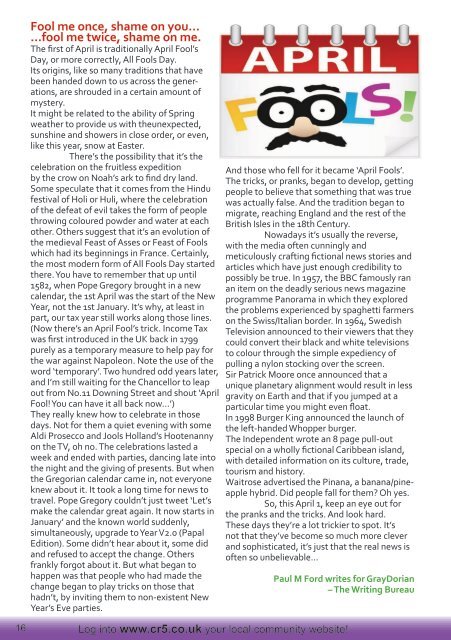You also want an ePaper? Increase the reach of your titles
YUMPU automatically turns print PDFs into web optimized ePapers that Google loves.
Fool me once, shame on you…<br />
…fool me twice, shame on me.<br />
The first of <strong>April</strong> is traditionally <strong>April</strong> Fool’s<br />
Day, or more correctly, All Fools Day.<br />
Its origins, like so many traditions that have<br />
been handed down to us across the generations,<br />
are shrouded in a certain amount of<br />
mystery.<br />
It might be related to the ability of Spring<br />
weather to provide us with theunexpected,<br />
sunshine and showers in close order, or even,<br />
like this year, snow at Easter.<br />
There’s the possibility that it’s the<br />
celebration on the fruitless expedition<br />
by the crow on Noah’s ark to find dry land.<br />
Some speculate that it comes from the Hindu<br />
festival of Holi or Huli, where the celebration<br />
of the defeat of evil takes the form of people<br />
throwing coloured powder and water at each<br />
other. Others suggest that it’s an evolution of<br />
the medieval Feast of Asses or Feast of Fools<br />
which had its beginnings in France. Certainly,<br />
the most modern form of All Fools Day started<br />
there. You have to remember that up until<br />
1582, when Pope Gregory brought in a new<br />
calendar, the 1st <strong>April</strong> was the start of the New<br />
Year, not the 1st January. It’s why, at least in<br />
part, our tax year still works along those lines.<br />
(Now there’s an <strong>April</strong> Fool’s trick. Income Tax<br />
was first introduced in the UK back in 1799<br />
purely as a temporary measure to help pay for<br />
the war against Napoleon. Note the use of the<br />
word ‘temporary’. Two hundred odd years later,<br />
and I’m still waiting for the Chancellor to leap<br />
out from No.11 Downing Street and shout ‘<strong>April</strong><br />
Fool! You can have it all back now…’)<br />
They really knew how to celebrate in those<br />
days. Not for them a quiet evening with some<br />
Aldi Prosecco and Jools Holland’s Hootenanny<br />
on the TV, oh no. The celebrations lasted a<br />
week and ended with parties, dancing late into<br />
the night and the giving of presents. But when<br />
the Gregorian calendar came in, not everyone<br />
knew about it. It took a long time for news to<br />
travel. Pope Gregory couldn’t just tweet ‘Let’s<br />
make the calendar great again. It now starts in<br />
January’ and the known world suddenly,<br />
simultaneously, upgrade to Year V2.0 (Papal<br />
Edition). Some didn’t hear about it, some did<br />
and refused to accept the change. Others<br />
frankly forgot about it. But what began to<br />
happen was that people who had made the<br />
change began to play tricks on those that<br />
hadn’t, by inviting them to non-existent New<br />
Year’s Eve parties.<br />
And those who fell for it became ‘<strong>April</strong> Fools’.<br />
The tricks, or pranks, began to develop, getting<br />
people to believe that something that was true<br />
was actually false. And the tradition began to<br />
migrate, reaching England and the rest of the<br />
British Isles in the 18th Century.<br />
Nowadays it’s usually the reverse,<br />
with the media often cunningly and<br />
meticulously crafting fictional news stories and<br />
articles which have just enough credibility to<br />
possibly be true. In 1957, the BBC famously ran<br />
an item on the deadly serious news magazine<br />
programme Panorama in which they explored<br />
the problems experienced by spaghetti farmers<br />
on the Swiss/Italian border. In 1964, Swedish<br />
Television announced to their viewers that they<br />
could convert their black and white televisions<br />
to colour through the simple expediency of<br />
pulling a nylon stocking over the screen.<br />
Sir Patrick Moore once announced that a<br />
unique planetary alignment would result in less<br />
gravity on Earth and that if you jumped at a<br />
particular time you might even float.<br />
In 1998 Burger King announced the launch of<br />
the left-handed Whopper burger.<br />
The Independent wrote an 8 page pull-out<br />
special on a wholly fictional Caribbean island,<br />
with detailed information on its culture, trade,<br />
tourism and history.<br />
Waitrose advertised the Pinana, a banana/pineapple<br />
hybrid. Did people fall for them? Oh yes.<br />
So, this <strong>April</strong> 1, keep an eye out for<br />
the pranks and the tricks. And look hard.<br />
These days they’re a lot trickier to spot. It’s<br />
not that they’ve become so much more clever<br />
and sophisticated, it’s just that the real news is<br />
often so unbelievable…<br />
Paul M Ford writes for GrayDorian<br />
– The Writing Bureau<br />
16 Log into www.cr5.co.uk your local community website!

















